Trending
Opinion: How will Project 2025 impact game developers?
The Heritage Foundation's manifesto for the possible next administration could do great harm to many, including large portions of the game development community.

Featured Blog | This community-written post highlights the best of what the game industry has to offer. Read more like it on the Game Developer Blogs or learn how to Submit Your Own Blog Post
Three weeks after release, I shared this statistic with a few online dev communities. The response and questions that followed surprised me more than the piracy itself. Here’s full details of how I got the number, and what I make of it.

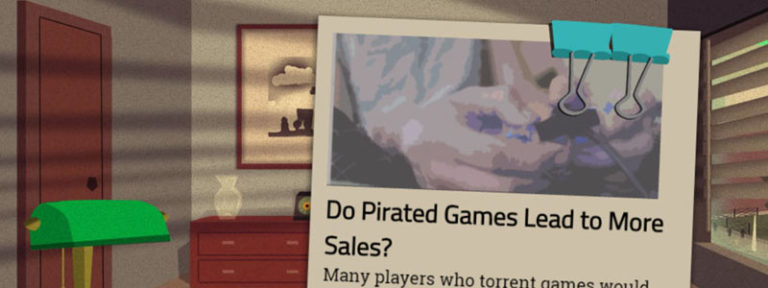 Three weeks after release, I shared this statistic with a few online dev communities. The response and questions that followed surprised me more than the piracy itself. Here’s full details of how I got the number, and what I make of it.
Three weeks after release, I shared this statistic with a few online dev communities. The response and questions that followed surprised me more than the piracy itself. Here’s full details of how I got the number, and what I make of it.
I used to pirate games. Growing up in Poland after the fall of communism, the weekend pirate-markets were how everyone got newest releases. Buying in stores was a very expensive rarity, offering a limited selection. It’s how things worked at the time. Nevermind half the bootleg copies were in Russian.
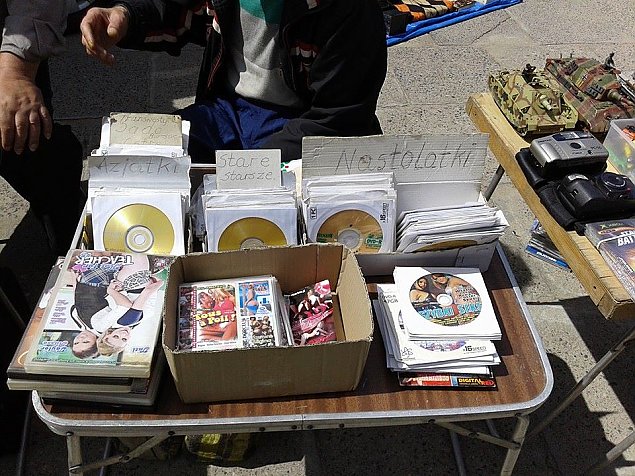
(Photo Source: Tu Stolica)
That, of course, changed as I got more into game development and realized I’m a massive hypocrite. But I also know fighting piracy is a losing battle – big triple-A studios pour millions into fancy DRMs that get cracked within a week. What can I, a small indie, hope to achieve?
I’d rather provide the most convenient experience to my paying supporters, even if it means my game is dead easy to pirate. As Gabe Newell said, the best way to win, is to provide a superior experience than pirating a game.
Surprisingly, half the replies I got were asking me how I know this. It surprised me because I figured it would be a no-brainer in the world of always-on internet and Steam distribution. Alas, let me assuage your curiosity.
My game, HEADLINER, is a short, thought-provoking adventure about media-bias where you control national news and its impact on your career, society, and family. Multiple unique endings let you share your story and see what the Headliner before you did. And this is where the magic happened. The game is simply sending and fetching data from a server somewhere, so it was easy enough to pass a little param indicating if the game is pirated or not. Given Steam is my only distribution platform (so far), it’s just a matter of checking if the Steam API is running.
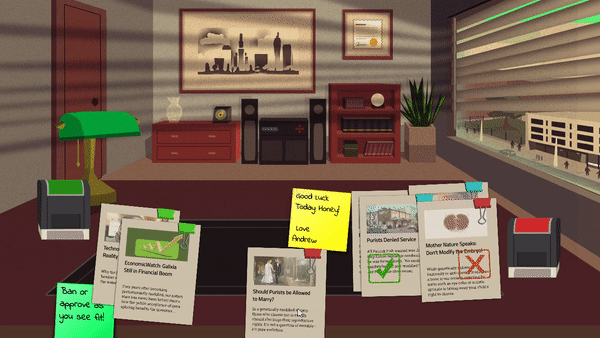
Caveat: the game actually does not require Steam to launch, so some of the reported pirates could be false positives. However, given I’ve not advertised it specifically as DRM-free, don’t sell it as a standalone, and playing it outside of Steam means losing out on Sweet Sweet Achievements™, I’d wager the number is fairly accurate.
This is a comment that inevitably pops up in most piracy discussions. “Aren’t you glad at least someone is playing your game?” I’d usually apologetically nod and smile at this comment. But it kept popping back into my mind and it would not let go, until I finally realized why:
It’s bullshit.
No, I am not glad at least someone is playing my game for free. What would that say about me? Should I really hold so little self-esteem for myself and my work as not to believe it is worth anything? If I did not believe my games were worth paying for, I would release them for free. And oh look, I did on some of my smaller titles.
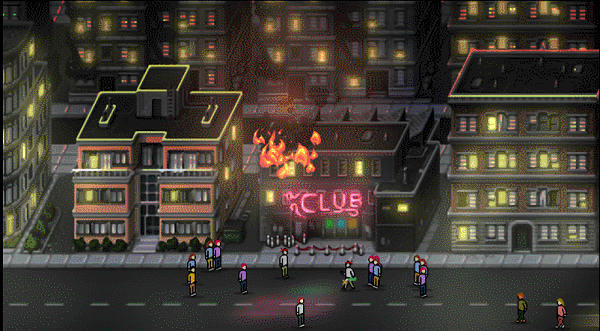
I put over a year of hard work and few thousands dollars into the game. This does not guarantee it’s good or worth paying for. But it does give me the right to hold some hopes. Yeah, the indie market suffers from a big shovelware problem and arguably many of the half-broken asset flips shouldn’t be sold as consumer products; but even so, just because some scummy devs hold themselves to low standards doesn’t mean they should bring the rest of us down with them.
Surprisingly (again), very few indie developers responding to me were willing to share their stats. From those who did, the piracy rate seems to be all over the place, so I can’t really draw any conclusions. But at least I did better than World of Goo reporting 90% of installs being pirated. Yikes…
Are pirates really lost sales, or people who would never buy your game in the first place? Could it function as the ever-ellusive vehicle of word-of-mouth and exposure?
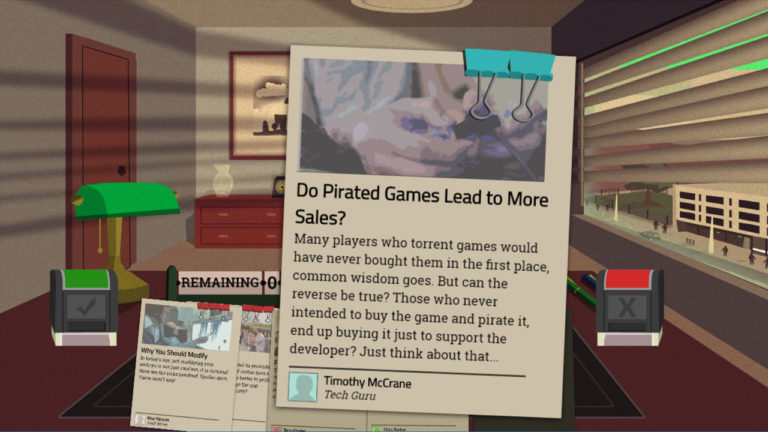
There’s been a recent study suggesting that piracy actually increases sales. The study design seems pretty solid, but it still relies on self-reported questionnaires and is the only one I know of so far. Conversely, The Extra Credits guys argued that demos are actually a net negative for developers. Does this logic extend to pirates then, or at least people who pirate as a way to “demo” a game? What about small indies, where playing a pirate “demo” means you probably played half the game already?
Honestly, I don’t know. Unless we do more tightly controlled studies, it is hard to say. Even so, it’s probably an issue we’ll never have a clear answer to. One thing is for sure: piracy will never go away. So what can we do about it?
I knew my game would get pirated eventually, and I prepared. I didn’t do anything malicious like Arkham Asylum, which would turn superhero Batman into a clumsy foe if played on a pirated version. I forgot what game it was, but I remember a story of a similar tactic resulting in massive review bombing, as pirates did not realize it was a deliberate tactic and not the game itself being broken.
Instead, I opted for more simple and positive approach – thanking the pirates for playing and asking them to considering supporting me. Here’s what the title screen looks like if you play the game illegally:
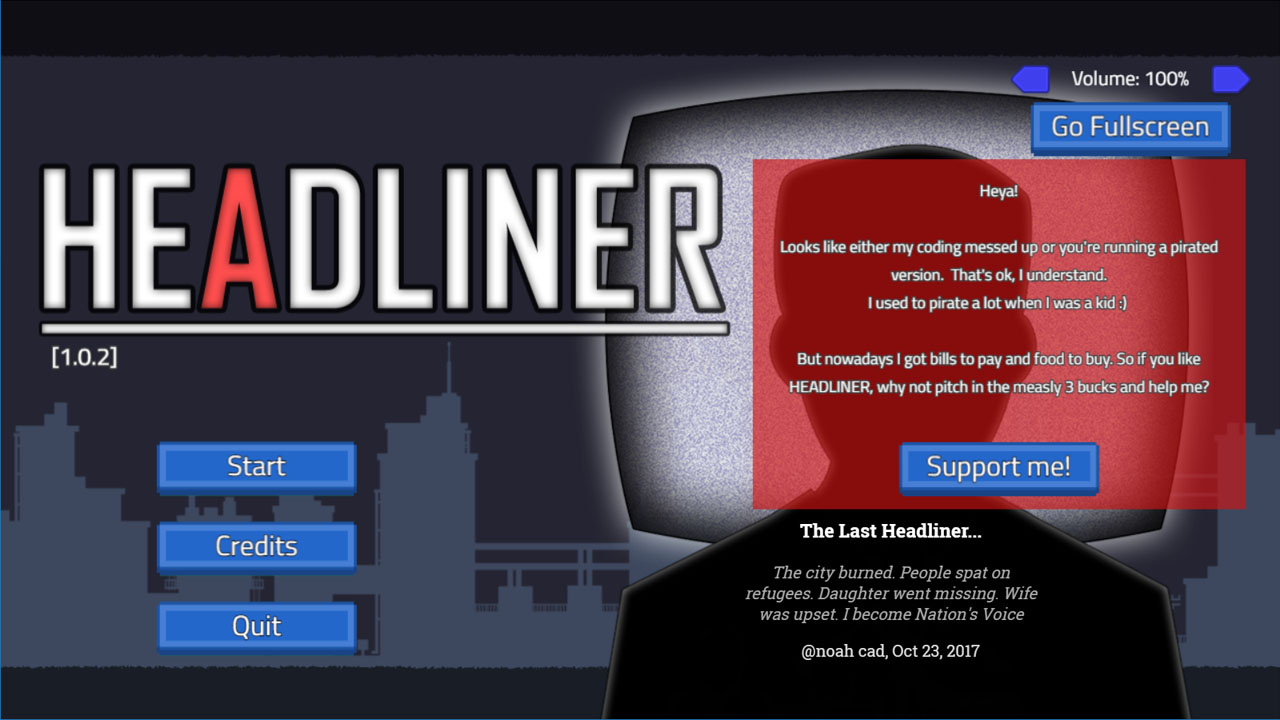
(Click for bigger)
Simple, to the point, and honest. Unfortunately I didn’t think far enough to put a tracker on the button, so I have no idea how many people actually clicked it. On top of that, the player also get a few bonus news articles in-game about piracy (see above), painting a rags-to-riches story of and indie lifted by pirates turning into rabid followers. One can hope, hehe…
Back in 2013, when I stumbled upon a warez link to my my very first game, I actually smiled. I saw it as marker of (small) success –
no, not the fact people are downloading it illegally, but the fact someone actually went through the effort of ripping it off and uploading to torrents.
Honestly, I share the statistic in ambivalence. I knew my game would get pirated and there was little I could do to stop it. I used to pirate as kid myself, so I understand the mentality. Especially in the days of endless sales and bundles – one of the user steam reviews for HEADLINER, a $2.99 game, told others to wait for a sale. That surprised me more than the piracy of the game itself, heh.
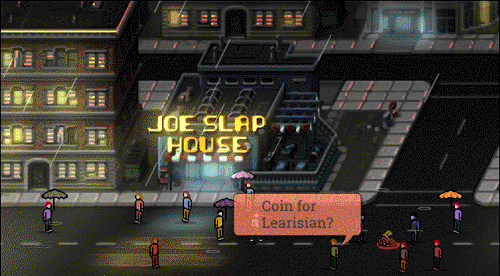
In conclusion, I’d say piracy is a problem that will always exist, so the best small indies can do is encourage the pirates to eventually become their supporters. In the meantime, if this topic intrigued you to check out HEADLINER, a short though-provoking adventure about how media bias affects the society and your own life, it’s out now on Steam!
And probably your friendly neighborhood torrent network ;p
I just downloaded one of the pirated copies of my game. They asked me to remove my ad-blocker to keep their site running. Oh the sweet irony:
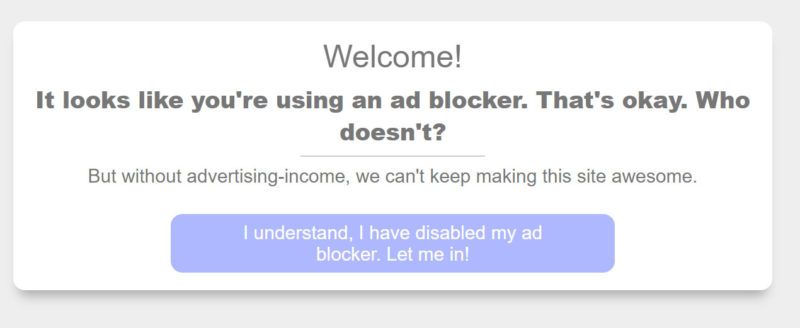
And wow - they sure put extra effort these days...
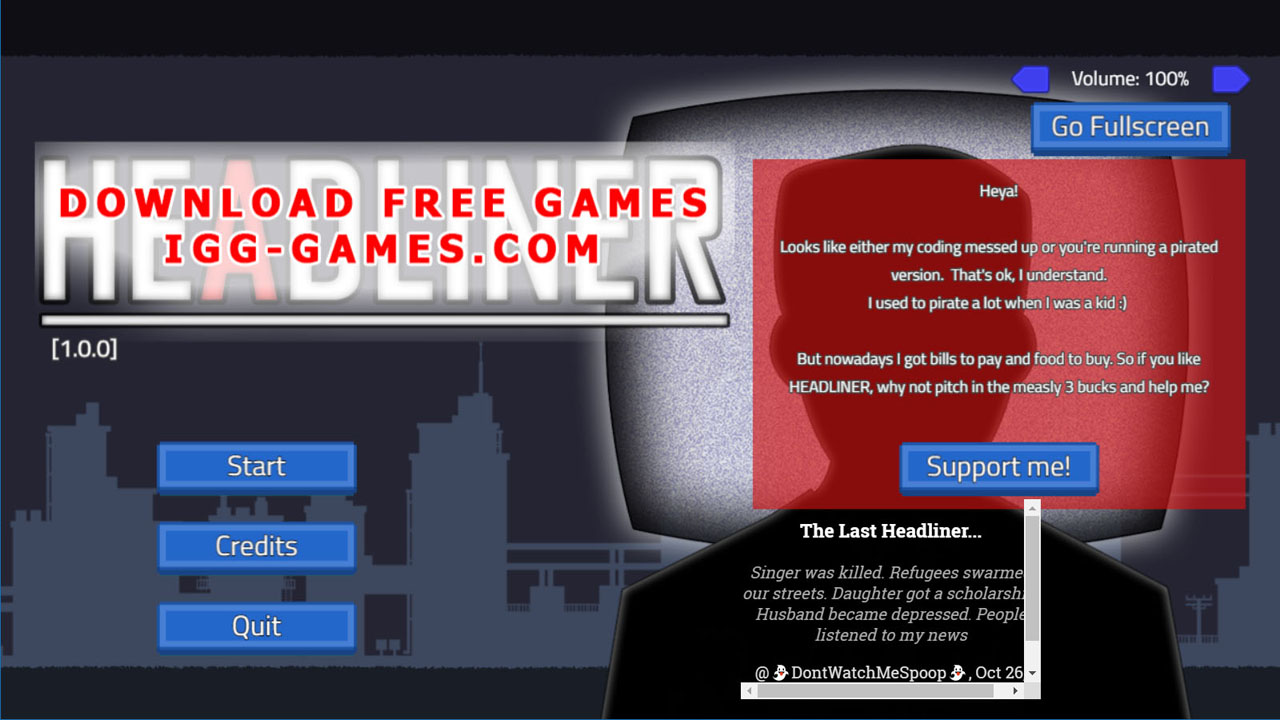
 Hi! I am a Polish-American, Game Dev and web consultant. I founded Unbound Creations, focusing on story-rich and introspective games. I published two commercial games before (“Postmortem: one must die” and “Karaski”), with HEADLNER being my third. My works have been a finalist at the Pixel Heaven Fest 2015 in Warsaw Poland, and on display at VALA Art Center in Redmond.
Hi! I am a Polish-American, Game Dev and web consultant. I founded Unbound Creations, focusing on story-rich and introspective games. I published two commercial games before (“Postmortem: one must die” and “Karaski”), with HEADLNER being my third. My works have been a finalist at the Pixel Heaven Fest 2015 in Warsaw Poland, and on display at VALA Art Center in Redmond.
Check out my Blog for more nuggets of ill-advised wisdom!
Read more about:
Featured BlogsYou May Also Like